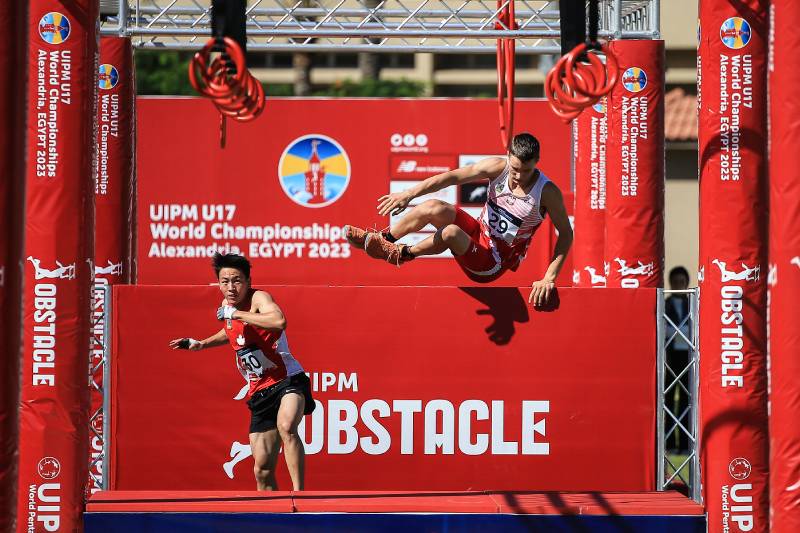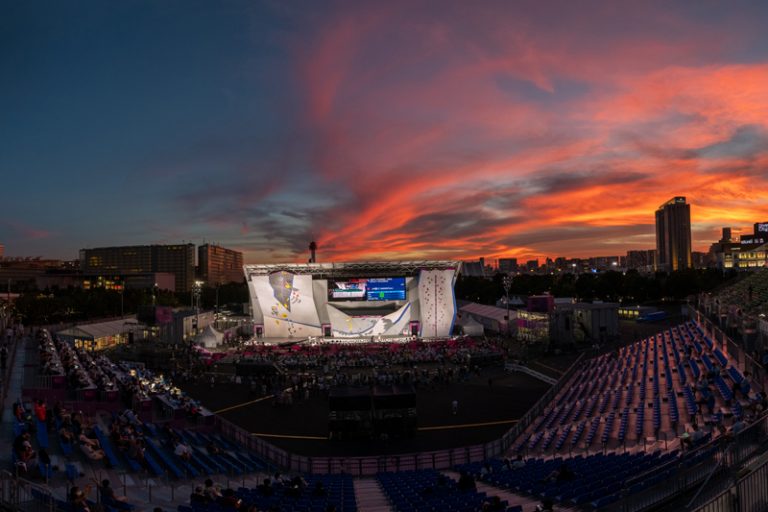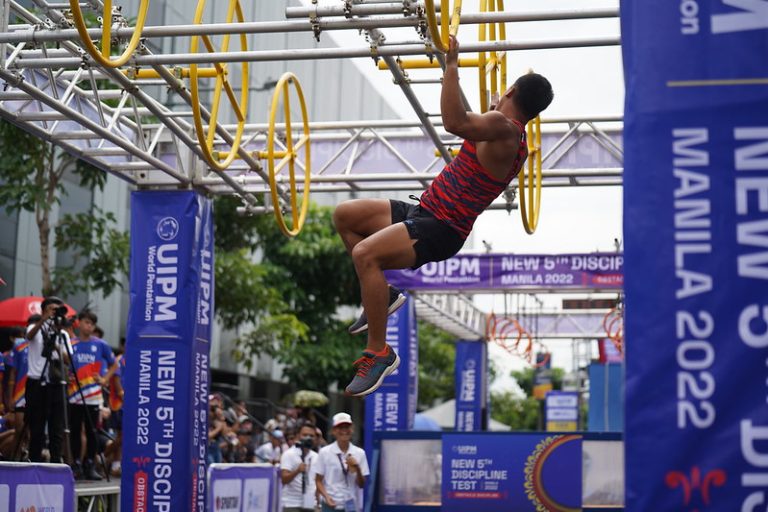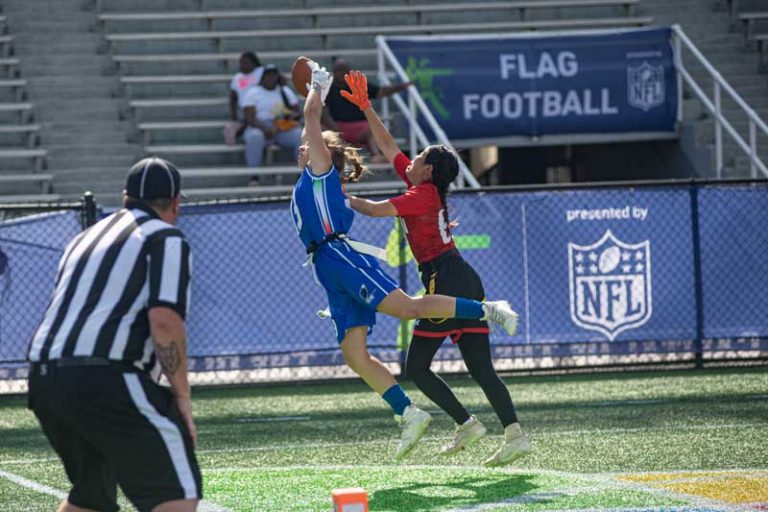The Olympics-built sport of modern pentathlon pulled itself through an existential crisis over the past two years, but some athletes believe it has come out as a better event with greater potential for the future.

“Two years ago, [World Pentathlon] was challenged like never before. Many times in the past three decades we had made dramatic changes to modern pentathlon, but this time it was necessary to execute a higher level of transformation,” governing body UIPM President Klaus Schormann said after the International Olympic Committee (IOC) confirmed this month that the sport could return to the Los Angeles 2028 edition of the Games.
Transformed to include the five elements of fencing, swimming, running, laser shooting and now obstacle racing to replace horse riding, modern pentathlon was told it had made the necessary changes to remain at the Games. Almost two years ago the sport was told by the IOC it needed to evolve or the Paris 2024 Games could be its last.
Modern pentathlon had received negative headlines during the pandemic delayed Tokyo 2020 Games after a German coach was caught on camera punching a horse after it refused to make a required jump. The sport then took a blow too, and the IOC opted for the program review.
“The UIPM must finalize its proposal for the replacement of horse riding and the overall competition format, and demonstrate a significant reduction in cost and complexity and an improvement across the areas of safety, accessibility, universality and appeal for young people and the general public.” – IOC Executive Board’s challenge to UIPM
The sport has been on every Games program since its start at the Stockholm 1912 Olympics after it was created by modern Olympics founder Pierre de Coubertin to mimic the pentathlon of the ancient Greek Games. If it were dropped from the program, the results could have been devastating.
“Obviously there are a few things to work out before the LA Games as well in fencing and different areas,” Ireland’s Natalya Coyle, retired three-time Olympian and member of the UIPM athletes committee told GamesBids.com.
“I think you can see how the sport has been able to pivot before so I do think it will be absolutely fine.”
Coyle said she was named to the UIPM commission tasked to explore possibilities for a new fifth element, then just days later the IOC’s edict forced her team into crisis mode.
Out of dozens of possible replacements obstacle racing was named as the potential new element, shocking some athletes who wanted to preserve the essence of the historic sport. That created what the The Guardian described as “civil war” between independent athletes who instead backed a modified horse riding element, and the UIPM. The athletes’ group, Pentathlon United asserted that “95%” disagreed with the UIPM’s decision and the process that it said lacked transparency.
Citing IOC president Thomas Bach’s insistence that the athletes were to be central in the decision making, Pentathlon United called for him to intervene. Bach stayed out of the process and last November the UIPM Congress overwhelmingly approved the plan, that was ultimately to modernize the event and stay in the Olympic Games.
“It’s just sport as a whole it doesn’t stand still – high performance sport just doesn’t, and once you look across every Olympic sport they’re all having to cater and change for new environments and new audiences and that’s what the Olympic Games wants,” Coyle said.
“Every sport will have to keep evolving.”
Wrestling discovered this ten years ago when the IOC threatened to expel the sport from the Games if it didn’t make key organizational changes and other improvements. After a drawn out campaign that included celebrity advocates and a complete overhaul of the sport – wrestling was readmitted.
Following the IOC’s reinstatement vote in 2013, United World Wrestling President Nenad Lalovic told GamesBids.com “The biggest value of this campaign was to modernize our sport and our federation. This crisis gave us the strength to change. And we finally found out we can change.”
https://twitter.com/WorldPentathlon/status/1713892795734188442
17-year-old Canadian modern pentathlon athlete Connor Chow believes the addition of obstacle racing will appeal to the younger generation and will help lock in a bright future for the sport. He told GamesBids.com “The youth appeal is definitely strongest in the obstacle right now because it’s new and its exciting and it’s an easy entry point for kids.”
“Obstacle, and with [television competition show] American Ninja Warrior, that’s a great way to advertise obstacle and make it seem really exciting. All kids went to the playground and played around there and that’s a fundamental start to obstacle.”
Coyle added “Everyone sees the potential of what this can do for our sport and also make it more mainstream and appeal more to the masses which is really exciting.”
“It makes it more accessible anyways because it’s tricky in a lot of countries, especially South America, and globally in general, to get access to horse riding. So this change will definitely make it more accessible for more people.”
Television shows such a Japan’s Sasuke and American Ninja Warrior have become cultural phenomena with tens-of-millions of international viewers, so obstacle will already be familiar to some Olympic fans and both modern pentathlon and the Olympics stand to gain a greater viewership. Changes to the modern pentathlon’s Olympic package will make it faster, more compact and easier for digital consumption – aligning with the competition shows.
Horse riding will still feature in the sport at Paris 2024 but athletes are making the transition now with obstacle already in world championship events.
“A lot of our athletes are focused on the Paris Games and they’ll also be looking now really excitedly for the LA Games. So a lot will be integrating obstacle in their training at the moment,” Coyle said.
For young athletes “the transition period is happening quite naturally.”
There’s no telling how expulsion from the Olympics might have impacted the sport, but it’s clear an Olympic future is a much brighter one for the growth and viability of modern pentathlon.
“At a certain point I decided I want to take [modern pentathlon] as far as it can get me and now hearing that it’s going to be in the LA 2028 Olympics it makes me even more excited because it means more potential for me,” Chow said.
“I think for youth looking at it now that’s a big selling point, having obstacle being in 2028 that a lot of people will be coming into it especially coming from obstacle course race backgrounds. They see their opportunity to make the Olympics through this new sport now.”
Coyle agrees, explaining “If a sport isn’t in the Olympic Games – like the Olympic Games is the pinnacle for any sport to be involved in – and I think that that is everything that everyone aspires to be, they wake up to be an Olympian, to win an Olympic gold medal and that’s a really tricky situation for a sport to be in if they’re not in the Olympic Games.”
And the impacts expand much further than those on the athletes, Coyle continued “You look at the ecosystem as a whole – you have all the coaches, the support staff, you’ve got government funding everywhere – and I think that’s something people don’t focus on as a whole as well as the wider spider web of jobs and infrastructure that Olympic sport gives and it would be really sad to see that go away.”
Certainly, a significant decrease in funding would have followed any Olympic expulsion – from the IOC, national Olympic committees and governments.
“There can always be more funding, that’s always how it goes,” said Chow, who trains at the Ares Pentathlon & Fencing Club in Calgary, a city that usually sees more money flow into winter sports.
“Now that it’s in the 2028 Olympics I think it’s good, it’s going to be promising for the future.
“There’s likely going to be more support going forward.”


